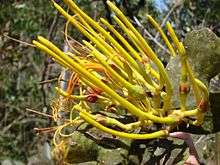Psittacanthus
Psittacanthus, also parrot-flower, is a plant genus in the family Loranthaceae. It is a type of mistletoe native from central Mexico southwards to Central America and parts of South America.[1]
| Psittacanthus | |
|---|---|
 | |
| Psittacanthus robustus | |
| Scientific classification | |
| Kingdom: | Plantae |
| Clade: | Tracheophytes |
| Clade: | Angiosperms |
| Clade: | Eudicots |
| Order: | Santalales |
| Family: | Loranthaceae |
| Genus: | Psittacanthus Mart. |
| Species | |
|
See text | |
It differs from most other Loranthaceae genera by its large flowers and bulky haustorial connections to its host, and by its large fruits.[2] Its flowers frequently "light up the host tree in brilliant hues of red or red and yellow".[2]
Life cycle
From inoculation of a branch with the seed to production of new seed on the plant requires about five years.[3] Psittacanthus is dispersed by birds feeding on fruits and defecating on branches. Once the mistletoe is established, it flowers yearly.[3] A five-year study of Psittacanthus calyculatus on Pinus douglasiana found that only five months after the sticky seed has inoculated the host tree, are the first true leaves produced.[3] In the May of the fourth year after infection, the shoots start to produce flower bud full flowering and pollination occurring in November and December.[3] (Hummingbirds and passerines are thought to be the pollinators.[3]) Fruit maturation takes about a year and occurs from November to February of the fifth year. The long life cycle means that infestations may be relatively easily controlled when trees are to be harvested for forestry.[3]
Accepted species[4]
|
|
|
Etymology
Psittacanthos comes from the Greek psittakos (parrot), and the Greek anthos (flower), possibly chosen, according to Don[5], because of the bright colours.
References
- Vázquez Collazo, I. & Geils, B.W. 2002. "Mistletoes of North American Conifers, Chapter 2: Psittacanthus in Mexico" (PDF). United States Forest Service. 2002. Retrieved November 30, 2014.
- Kuijt, J. 2009. "Monograph of Psittacanthus (Loranthaceae)." Systematic Botany Monographs, vol. 86, pp. 1–361. JSTOR Retrieved 20 June 2018
- Vasquez Collazo, I. & Geils, B.W. 2002. Chapter 2 Psittacanthus in Mexico. In 'Mistletoes of North American Conifers.'doi:10.2737/RMRS-GTR-98 [www.fs.fed.us/rm/pubs/rmrs_gtr098/rmrs_gtr098_009_017.pdf pdf]{
- Govaerts, R. et.al. 2018. Psittacanthus Plants of the World online, Board of Trustees of the Royal Botanic Gardens, Kew. Retrieved 20 June 2018.
- Don, G. 1834. "A general history of the dichlamydeous plants :comprising complete descriptions of the different orders...the whole arranged according to the natural system 3: 415".
External links

Distribution of Psittacanthus sonorae: http://swbiodiversity.org/seinet/taxa/index.php?taxon=Psittacanthus+sonorae